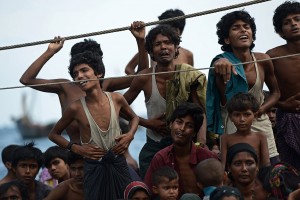By Aneesa Malik
The British public needs to get on its feet and use their voices to make a stand against the atrocities taking place against the Rohingya people, says leading charity, Burma Campaign UK.
If you don’t quite understand what you’re making understand against, then lets help break it down.
The Rohingya people are an ethnic minority group currently residing in the state of Myanmar. While the Rohingyas say they are descendants of Arab traders who have been in the region for generations, Myanmar’s governments say they are not a genuine ethnic group but are actually Bengali migrants. Successive Myanmar governments have been introducing policies to repress the Rohingya since the 1970s, according to Burmese Rohingya Organisation UK (Brouk).
 As we speak there are close to 8,000 migrants currently stranded at sea between Malaysia, Thailand and Indonesia, with limited countries willing to provide solace. Mark Farmaner, Director of Burma Campaign UK has explained the root cause for the current situation of the Rohingya people, saying: “The Burmese government is deliberately trying to drive the Rohingya people out of Burma and is using two methods. One is deliberately impovering the Rohingya and the other is through repression; through direct attacks and through laws and policies that discriminate against the Rohingya, with the goal to make life so unbearable, that they leave. We think this is effective around 20% of the Rohingya population.”
As we speak there are close to 8,000 migrants currently stranded at sea between Malaysia, Thailand and Indonesia, with limited countries willing to provide solace. Mark Farmaner, Director of Burma Campaign UK has explained the root cause for the current situation of the Rohingya people, saying: “The Burmese government is deliberately trying to drive the Rohingya people out of Burma and is using two methods. One is deliberately impovering the Rohingya and the other is through repression; through direct attacks and through laws and policies that discriminate against the Rohingya, with the goal to make life so unbearable, that they leave. We think this is effective around 20% of the Rohingya population.”
In the past three years, more than 120,000 Rohingyas have boarded ships to flee abroad, according to the UN refugee agency. It says 25,000 migrants left Myanmar and Bangladesh in the first quarter of this year, about double the number over the same period last year. As an international charity, Mark is calling on the world community to unite against such oppression. “We are asking for two actions from the international community. The first is that Ban Ki- moon, the UN Secretary General, should personally take the lead in negotiating international human access, where most Rohingya people live. The second is that the UN establishes a commission of enquiry into the human rights violations and policies against the Rohingya people because these break international law. It seems that the government and opposition parties are not willing to take action. So, if there is going to be action, it will have to be through the international community and that should start with an international investigation.”
Mark believes there is an underlying reason behind why no country- particularly the UK, is providing any substantial aid. “What has happened in Burma is that the generals took off their uniform and established a new government five years ago. They said they were going to reform and take Burma to democracy and so the international community dropped all the sanctions and all the pressure and rushed in to do business with them- even though they were still in the reform process. Now they don’t want to admit that they were duped; that they were suckered by the generals and that the reforms aren’t genuine.”
The UK has dropped its human rights priority, according to Mark, “It used to lead the world in human rights in Burma, but now they’ve dropped their human rights as a priority and they are promoting trade. Not only are they not doing anything about the human rights issue, but they are playing down the issue because if they accept that there is a problem, then there will be pressure on them to act.”
The best advice that Mark provides is to talk to your local MP; write or go and see your MP to contact the foreign secretary to speak about this in parliament. Mark was adamant, “It really does work and can change British policy.”


















